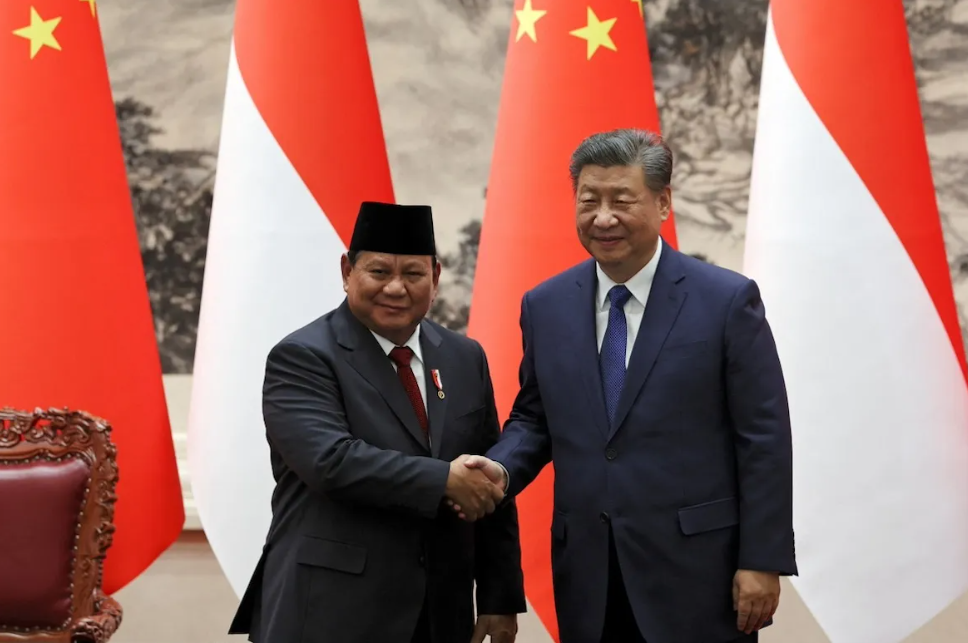Prabowo in Washington after Beijing as instability rises in the South China Sea
Indonesia's president, who took office last month, signed a series of agreements with China. Despite advocating a policy of non-alignment between rival big powers, his signature appears to have implicitly acknowledged Beijing's claims. Prabowo discussed the issue with Joe Biden. For, analysts, this is a serious mistake by an inexperienced administration.
Jakarta (AsiaNews) – After an official visit to China on 8-10 November, Indonesian President Prabowo Subianto flew yesterday to the United States to meet outgoing President Joe Biden.
This, together with the congratulatory phone call to Donald Trump posted on social media, show Indonesia’s desire to maintain a policy of non-alignment between the two rival powers.
Yet, perhaps without realising it, Prabowo appears to be turning towards China by signing a series of cooperation agreements, which he had to explain in Washington.
Son-in-law of the late Suharto and commander of the Indonesian special forces Kopassus, Prabowo was previously denied a visa to visit the United States following accusations of human rights violations in Timor Leste and Papua, a province with a strong pro-independence movement.
The change of course took place in 2020 during the first Trump administration, which had invited Prabowo when he was Indonesian defence minister, a position he held until last month, when he was sworn in as president after winning the presidential election last February.
Although Trump's return to the White House is imminent, Prabowo discussed strategic issues with outgoing US Secretary of Defence Lloyd Austin and CIA Director William Burns, focusing on the South China Sea, where tensions between China and Southeast Asian countries are commonplace.
Biden expressed hope that the two countries could cooperate for a "free and open Indo-Pacific” with the Association of Southeast Asian Nations (ASEAN) at its centre. This reflects bipartisan support in the US Congress for closer ties with Indonesia to curb Chinese ambitions.
In previous statements, Prabowo had claimed to respect "both China and the United States" describing them as "good friends", and that he intends to maintain the country’s traditional "non-aligned foreign policy”.
However, Prabowo has been widely criticised for signing last week a controversial South China Sea cooperation agreement with China (as well as contracts worth US$ 10 billion) that some say recognises Beijing's claims to sovereignty over disputed waters.
Until now, all the other countries in the region (the Philippines, Vietnam, Malaysia, and Brunei) had always avoided signing joint development agreements with China, fearing that they would end up implicitly recognising the so-called nine-dash line, a set of line segments in the South China Sea that delineate an area over which the People's Republic of China claims sovereignty.
The joint statement issued after his Beijing visit stressed that the two countries had “reached important common understanding on joint development in areas of overlapping claims,” including setting up an intergovernmental joint steering committee to manage the development, “pursuant to their respective prevailing laws and regulations.”
The problem in the statement is the reference to the "overlapping claims".
Indonesia had never embraced China’s view that Indonesia's exclusive economic zone fell within the nine-dash line, with Jakarta simply exercising sovereignty over the area, which includes the Natuna Islands.
After the controversy broke, Indonesian Foreign Minister Sugiono was quick to clarify that Jakarta's position has not changed and Beijing’s requests are still deemed unfounded under international law.
Still, one of the economic agreements signed by Prabowo concerns joint development of fishing and oil and gas exploration near the Natuna Islands.
Some experts note that Prabowo (perhaps even implicitly) gave Beijing "a historic victory", and “betrayed Indonesia's national interest".
The Indonesian statement makes it harder for ASEAN to sign a deal with China and could have repercussions on the foreign policy of other Southeast Asian countries.
For several observers, this was an unforced error by a green and untested administration. And Beijing is likely to ignore the Foreign Ministry's "corrections", and instead hold to its own interpretation of the joint statement.
Prabowo picked as foreign minister Sugiono,[*] who entered politics only in 2019, while his predecessor, Retno Marsudi, was a long-term diplomat.
This is “starting to look like a giant mistake by a very inexperienced foreign minister,” one analyst said, with a major impact on short-term relations with China (and the United States).
[*] As is customary in the country, Sugiono, like many Indonesians, has no surname.
29/05/2020 15:53







.png)










